情态动词课件.ppt
合集下载
情态动词(20张PPT)初中英语专项复习课件

看法。
(1)只作情态动词:must;can/could;may/might;ought to
(2)既可作情态动词又可作实义动词:need,dare
((34))既 具可 有作 情情 态态 动动词词某又些可特作征稿稿定助:定hPa动PPvTP,e词T/海h:量asd素ha材tlo持l;/s续hha更odublde;twteirll/would
【知识拓展】
1. must的一般疑问句,肯定回答为Yes, ...must.;否定回答为No, ...needn’t./No, ...don’t have
to.—Must I clean the classroom now? 我必须现在打扫教室吗?
—Yes, you must. 是的,你必须。/No, you don’t have to. /No, you needn’t. 不,你不必。
He promised he would never smoke again. 他承诺他再也不吸烟了。
Their English teacher would tell them stories in
表示过去反复发生的动 English after class.
作或某种倾向
他们的英语老师总是在课后用英语给他们讲故事
新,上千款模板选择总有一
款适合你
知识点二:情态动词的特点
情态动词的特点: (1)情态动词无人称和数的变化(have to除外); (2)情态动词后接动词原形; (3)情态动词的否定式是在其后加not; have to除外 (4)具有助动词的作用,可用来构成否定句、疑问句及用于简明答语; (5)个别情态动词有现在式和稿过定去PP式T两种形式,过去式用来表达更加客气、委 婉的语气,时态性不强,可稿用定于PPT过,海去量、素材现持在续更或将来。
(1)只作情态动词:must;can/could;may/might;ought to
(2)既可作情态动词又可作实义动词:need,dare
((34))既 具可 有作 情情 态态 动动词词某又些可特作征稿稿定助:定hPa动PPvTP,e词T/海h:量asd素ha材tlo持l;/s续hha更odublde;twteirll/would
【知识拓展】
1. must的一般疑问句,肯定回答为Yes, ...must.;否定回答为No, ...needn’t./No, ...don’t have
to.—Must I clean the classroom now? 我必须现在打扫教室吗?
—Yes, you must. 是的,你必须。/No, you don’t have to. /No, you needn’t. 不,你不必。
He promised he would never smoke again. 他承诺他再也不吸烟了。
Their English teacher would tell them stories in
表示过去反复发生的动 English after class.
作或某种倾向
他们的英语老师总是在课后用英语给他们讲故事
新,上千款模板选择总有一
款适合你
知识点二:情态动词的特点
情态动词的特点: (1)情态动词无人称和数的变化(have to除外); (2)情态动词后接动词原形; (3)情态动词的否定式是在其后加not; have to除外 (4)具有助动词的作用,可用来构成否定句、疑问句及用于简明答语; (5)个别情态动词有现在式和稿过定去PP式T两种形式,过去式用来表达更加客气、委 婉的语气,时态性不强,可稿用定于PPT过,海去量、素材现持在续更或将来。
情态动词语法讲解PPT课件
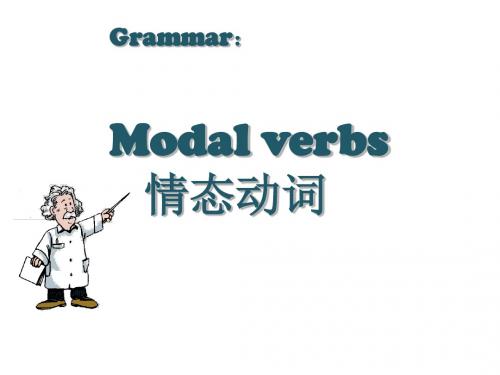
•You will wait outside the gate. •Brian! You will close the door.
b)表示“必然”,可用should,ought to和 must(一般用于陈述句),其中must口气最为 肯定。都指说话人根据一定情况做出推测或 判断.
•She should be here in a minute
•They must be home by now.(他们现在一定到家了)
will/would表示“推测”可有三种情况
1)对特定事态的推测
A: Who’s that man over there? B: That will be George, no doubt. C: That would be George, I except.
过去“能力”: could, was/were
able to
肯定句:
•Could:一般能力
• She could play the piano when she was only six.
• was/were able to(及managed to):具体 事件
• He was able to translate the article without a dictionary.
b)表示“可能”,可用may, might,
can, could
may/might:
1.既可以表示现在的可能,也可表示将来 的可能,might在口气上比may更委婉
• 现在:It may/might be true. • 将来:He may/might leave tomorrow.
2.在疑问句中,用can,不用may。
如果是推测过去的事态,则用must +have done
b)表示“必然”,可用should,ought to和 must(一般用于陈述句),其中must口气最为 肯定。都指说话人根据一定情况做出推测或 判断.
•She should be here in a minute
•They must be home by now.(他们现在一定到家了)
will/would表示“推测”可有三种情况
1)对特定事态的推测
A: Who’s that man over there? B: That will be George, no doubt. C: That would be George, I except.
过去“能力”: could, was/were
able to
肯定句:
•Could:一般能力
• She could play the piano when she was only six.
• was/were able to(及managed to):具体 事件
• He was able to translate the article without a dictionary.
b)表示“可能”,可用may, might,
can, could
may/might:
1.既可以表示现在的可能,也可表示将来 的可能,might在口气上比may更委婉
• 现在:It may/might be true. • 将来:He may/might leave tomorrow.
2.在疑问句中,用can,不用may。
如果是推测过去的事态,则用must +have done
《情态动词表推测》课件

根据所给语境,选择合适的情态动词表达对过去事实的 推测。
通过实际语境中的情态动词使用,培养语言逻辑思维能 力。
练习题三:对将来事实的推测
掌握对将来事实的推测 理解情态动词在时间表达中的运用
提高语言表达能力
练习题三:对将来事实的推测
01
练习内容:
02
根据所给语境,选择合适的情态动词表达 对将来事实的推测。
《情态动词表推测》ppt课件
目录
• 情态动词表推测的定义 • 情态动词表推测的用法 • 情态动词表推测的注意事项 • 情态动词表推测的练习与解析 • 总结与回顾
01
情态动词表推测的定义
什么是情态动词
01
情态动词是表示说话人的语气和 态度的动词,它们通常与助动词 结合使用,表达可能性、必要性 、意愿等意义。
02
情态动词表推测的用法
对现在事实的推测
总结词
表示对目前情况的推测
详细描述
情态动词如“may”,“might”,“could”等可以用来表示对目前情况的推 测,通常基于某些证据或迹象,但不确定。例如:“It may be raining today ,based on the dark clouds in the sky.”
以上内容仅供参考,具体内容可以根据实际需求进行修改和 调整。
04
情态动词表推测的练习与解析
练习题一:对现在事实的推测
掌握对现在事实的推 测
提高语言实际运用能 力
理解不同情态动词的 细微差别
练习题一:对现在事实的推测
01
练习内容:
02
03
04
根据所给语境,选择合适的情 态动词表达对现在事实的推测
02
常见的情态动词有can、may、 must、should等。
《情态动词》PPT课件
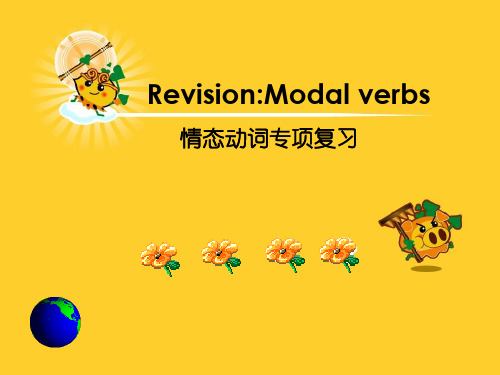
work our this problem. 如果你睡个好觉,那么你就能做出这个题目。 3、表示过去的能力: could表示过去一般的能力, 但不表示做或未做某事;
was/ were able to表示过去有能力并且成功地做了某事, 相当于managed to do something/ succeeded in doing something;
• Mr. Bush is on time for everything. How can it be that he was late for the opening ceremony? (表疑惑、惊讶)
表示请求、允许、允诺
1. 当对方是决策者时,你代表你(们)自己(I, We),或代表第三者(he,she,they)向对方 (you)请示或提出建议时用:
Revision:Modal verbs
情态动词专项复习
How many modal verbs
do you remember?
(情态动词)
一,常见的情态动词有:can, could, may, might ,must, shall, should, will, would, need, have to等
4、具有情态动词的某些特征的有:have(had) to, used to.
情态动词的特征
1、有一定的词义,但不能单独作谓语,它们要和行 为动词或连系动词连用,构成谓语。
2、适用于主语的各种人称和数 have to例外,主语 是第三人称单数时,要用has to)。如:
We/ He must work hard. 我们/他一定要努力工作。 I have to walk home. 我得步行回家。 He has to walk home. 他得步行回家。
was/ were able to表示过去有能力并且成功地做了某事, 相当于managed to do something/ succeeded in doing something;
• Mr. Bush is on time for everything. How can it be that he was late for the opening ceremony? (表疑惑、惊讶)
表示请求、允许、允诺
1. 当对方是决策者时,你代表你(们)自己(I, We),或代表第三者(he,she,they)向对方 (you)请示或提出建议时用:
Revision:Modal verbs
情态动词专项复习
How many modal verbs
do you remember?
(情态动词)
一,常见的情态动词有:can, could, may, might ,must, shall, should, will, would, need, have to等
4、具有情态动词的某些特征的有:have(had) to, used to.
情态动词的特征
1、有一定的词义,但不能单独作谓语,它们要和行 为动词或连系动词连用,构成谓语。
2、适用于主语的各种人称和数 have to例外,主语 是第三人称单数时,要用has to)。如:
We/ He must work hard. 我们/他一定要努力工作。 I have to walk home. 我得步行回家。 He has to walk home. 他得步行回家。
情态动词专题知识公开课获奖课件

第7页
②在予以他人许可时,常用can,但有时也用may。不能用 might。
-May I play basketball this afternoon? 今天下午我可以打篮球吗? -Yes,you may. 行,可以。
第8页
(2)表达也许性 may和might表达也许性时,可以对目前、过去或未来进行 推测。 Peter may e with us tonight,but he isn't sure yet. 彼得今晚也许和我们一起来,但他还没确定。 He might be studying in the classroom. 他也许正在教室里学习。
用于必定句,表示对
taken the other road.It might have
过去没有做某事遗憾,意思 been quicker.可能我们本应走另一
should/ou 为“原来能够……(但实际 条路,那样可能更加快些。
第17页
(3)用于法律、公约、约定等正式条文,重要用于第三人称。 Students shall remain in their seats until all the papers have been collected. 试卷所有收回后学生方可离开座位。
第18页
5. will和would使用措施 作情态动词will,would与作助动词will,would多种形式相 似。 (1)表达自愿做或积极提出做什么,如意志、愿望或决心等。 would用于过去状况。
第14页
The TV set is broken. I have to buy a new one. 电视机坏了。我不得不再买台新。 The students will have to know how to use the puters. 学生将必须理解怎样使用电脑。 He had to go,because his mother was ill. 他不得不离开,由于他母亲病了。
②在予以他人许可时,常用can,但有时也用may。不能用 might。
-May I play basketball this afternoon? 今天下午我可以打篮球吗? -Yes,you may. 行,可以。
第8页
(2)表达也许性 may和might表达也许性时,可以对目前、过去或未来进行 推测。 Peter may e with us tonight,but he isn't sure yet. 彼得今晚也许和我们一起来,但他还没确定。 He might be studying in the classroom. 他也许正在教室里学习。
用于必定句,表示对
taken the other road.It might have
过去没有做某事遗憾,意思 been quicker.可能我们本应走另一
should/ou 为“原来能够……(但实际 条路,那样可能更加快些。
第17页
(3)用于法律、公约、约定等正式条文,重要用于第三人称。 Students shall remain in their seats until all the papers have been collected. 试卷所有收回后学生方可离开座位。
第18页
5. will和would使用措施 作情态动词will,would与作助动词will,would多种形式相 似。 (1)表达自愿做或积极提出做什么,如意志、愿望或决心等。 would用于过去状况。
第14页
The TV set is broken. I have to buy a new one. 电视机坏了。我不得不再买台新。 The students will have to know how to use the puters. 学生将必须理解怎样使用电脑。 He had to go,because his mother was ill. 他不得不离开,由于他母亲病了。
我的公开课情态动词课件

2. —What’s the name of the book? —Khulaifi. _________ I spell it for you? A. Shall B. Would C. Can D. Might
情态动词表必要性
• must • need
高考真题演练
must 表“必须”
mustn’t 禁止
A. might B. must C. would D. can
3. What do you mean, there are only ten tickets? There ______ be twelve.
A. should B. would C. will D. shall
4. It is usually warm in my hometown in March, but it _____ be rather cold sometimes.
1. 不必须
don’t have to needn’t do
don’t need to
2. must还可表示“偏偏、偏要” e.g. Must you make so much noise?
• You ___ buy a gift, but you can if you want to.
• must
1. 常用于否定句或疑问句。 e.g. You can’t be hungry already — you had
lunch only two hours ago!
2. can用于肯定句中表示理论上的可能性,并不 牵涉是否真的会发生
e.g. You can hurt yourself if you play in the street.
A. must B. can C. should D. would
情态动词-完整版PPT课件
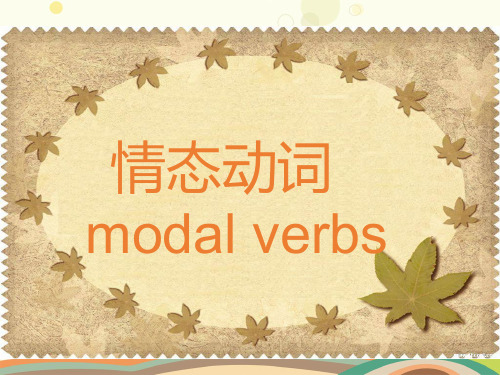
情态动词 modal verbs
1.情态动词的用法特点
1)情态动词 除 ought 和 have 外,后面只能 接不带to 的不定式。 2)情态动词没有人称,数的变化,即情态动 词第三人称单数不加-s。 3)情态动词没有非谓语形式,即没有不定式, 分词等形式。
can could may might shall should must will would ought to
have to dare need used to
表示推测
情态动词
不表示推测
2.表示推测——情态动词的重要用法.
情态动词
对将来
对现在
对过去
m肯ust/定sho的uld 推测
+ V. + V. + have done
常见must be + be doi定的推测 can’t, couldn’t
疑问的推测
can, could
+ V.
+ V.
+ have done
+ be doing
可以用not表示“可能不”
+V.
+ V.
+ have done
+ be doing
+ V.
+ V.
+ have done
+ be doing
不同的“肯定”程度可按下列层次排列: He is at home. (事实) He must be at home.(非常肯定的推断) He ought to be at home.(很可能) He could be at home.(很可能) He may be at home.(仅仅可能而已) He might be at home.(或许, 非常不确定) He might not be at home.(也许不在家) He may not be at home. (比might可能) He couldn’t be at home.(很可能不在家) He can’t be at home.(一定不在家)
1.情态动词的用法特点
1)情态动词 除 ought 和 have 外,后面只能 接不带to 的不定式。 2)情态动词没有人称,数的变化,即情态动 词第三人称单数不加-s。 3)情态动词没有非谓语形式,即没有不定式, 分词等形式。
can could may might shall should must will would ought to
have to dare need used to
表示推测
情态动词
不表示推测
2.表示推测——情态动词的重要用法.
情态动词
对将来
对现在
对过去
m肯ust/定sho的uld 推测
+ V. + V. + have done
常见must be + be doi定的推测 can’t, couldn’t
疑问的推测
can, could
+ V.
+ V.
+ have done
+ be doing
可以用not表示“可能不”
+V.
+ V.
+ have done
+ be doing
+ V.
+ V.
+ have done
+ be doing
不同的“肯定”程度可按下列层次排列: He is at home. (事实) He must be at home.(非常肯定的推断) He ought to be at home.(很可能) He could be at home.(很可能) He may be at home.(仅仅可能而已) He might be at home.(或许, 非常不确定) He might not be at home.(也许不在家) He may not be at home. (比might可能) He couldn’t be at home.(很可能不在家) He can’t be at home.(一定不在家)
小学英语语法课件-情态动词can PPT课件 全国通用
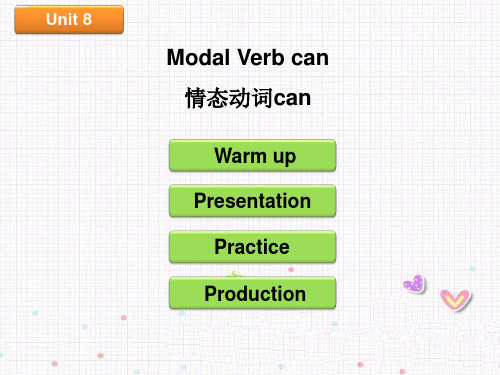
Dolphins can jump high and do tricks. Dolphins can’t fly. — Can dolphins see well and make lots of sounds? — Yes, they can. What can dolphins do?
小 学 英 语 语 法课件 -情态动 词can P PT课 件 全 国 通用
小 学 英 语 语 法课件 -情态动 词can P PT课 件 全 国 通用
Presentation
Sentences
1. 肯定句:主语+can +动词原形+其他 I can dance. 我会跳舞。
2. 否定句:主语+can’t+动词原形+其他 I can’t dance. 我不会跳舞。
3. 一般疑问句及回答:Can+主语+动词原形+其他? — Can you dance? 你会跳舞吗? — Yes, I can. / No, I can’t. 是的,我会。/不,我不会。
Sentences
He can’t be at home. 他不可能在家。 Can he come here today, please? 请问他今天能来这里吗?
can在句中表示可能,常用于否定句或疑问句中,指某种 可能性。
小 学 英 语 语 法课件 -情态动 词can P PT课 件 全 国 通用
小 学 英 语 语 法课件 -情态动 词can P PT课 件 全 国 通用
小 学 英 语 语 法课件 -情态动 词can P PT课 件 全 国 通用
Presentation
Sentences
Koalas and polar bears can climb fast and swim fast. Koalas and polar bears can’t fly. — Can koalas and polar bears eat fish and plants? — Yes, they can. What can koalas and polar bears do?
情态动词表推测课件ppt
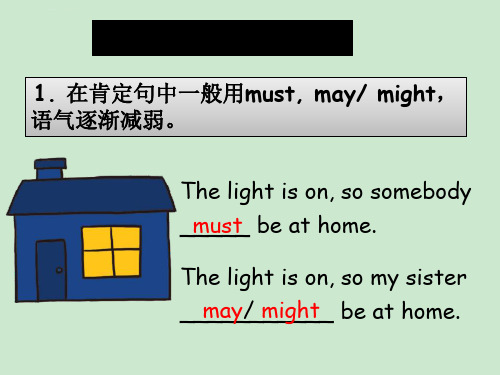
从使用情况来看,闭胸式的使用比较 广泛。 敞开式 盾构之 中有挤 压式盾 构、全 部敞开 式盾构 ,但在 近些年 的城市 地下工 程施工 中已很 少使用 ,在此 不再说 明。
表推测的三种句式
1. 在肯定句中一般用must, may/ might, 语气逐渐减弱。
The light is on, so somebody _m__us_t_ be at home.
The light is on, so my sister __m_a_y_/_m__ig_h_t_ be at home.
从使用情况来看,闭胸式的使用比较 广泛。 敞开式 盾构之 中有挤 压式盾 构、全 部敞开 式盾构 ,但在 近些年 的城市 地下工 程施工 中已很 少使用 ,在此 不再说 明。
表推测的三种句式
2.在否定句中用can’t/ couldn’t(不可能), may not/ might not(可能不)。
It’s sunny. It __c_an_’t__ rain.
He _m_a_y_n_o_t_/_m_ig_h_t_n_o_t know how to answer this question.
must表示推测时,不用 于否定句或疑问句。
从使用情况来看,闭胸式的使用比较 广泛。 敞开式 盾构之 中有挤 压式盾 构、全 部敞开 式盾构 ,但在 近些年 的城市 地下工 程施工 中已很 少使用 ,在此 不再说 明。
情态动词表推测的三种时态
对现在或一般情况的推测 “情态动词+be” “情态动词+be doing” “情态动词+动词原形”
否定形式:can’t (couldn’t) have done “不可能,肯定不会”
从使用情况来看,闭胸式的使用比较 广泛。 敞开式 盾构之 中有挤 压式盾 构、全 部敞开 式盾构 ,但在 近些年 的城市 地下工 程施工 中已很 少使用 ,在此 不再说 明。
表推测的三种句式
1. 在肯定句中一般用must, may/ might, 语气逐渐减弱。
The light is on, so somebody _m__us_t_ be at home.
The light is on, so my sister __m_a_y_/_m__ig_h_t_ be at home.
从使用情况来看,闭胸式的使用比较 广泛。 敞开式 盾构之 中有挤 压式盾 构、全 部敞开 式盾构 ,但在 近些年 的城市 地下工 程施工 中已很 少使用 ,在此 不再说 明。
表推测的三种句式
2.在否定句中用can’t/ couldn’t(不可能), may not/ might not(可能不)。
It’s sunny. It __c_an_’t__ rain.
He _m_a_y_n_o_t_/_m_ig_h_t_n_o_t know how to answer this question.
must表示推测时,不用 于否定句或疑问句。
从使用情况来看,闭胸式的使用比较 广泛。 敞开式 盾构之 中有挤 压式盾 构、全 部敞开 式盾构 ,但在 近些年 的城市 地下工 程施工 中已很 少使用 ,在此 不再说 明。
情态动词表推测的三种时态
对现在或一般情况的推测 “情态动词+be” “情态动词+be doing” “情态动词+动词原形”
否定形式:can’t (couldn’t) have done “不可能,肯定不会”
从使用情况来看,闭胸式的使用比较 广泛。 敞开式 盾构之 中有挤 压式盾 构、全 部敞开 式盾构 ,但在 近些年 的城市 地下工 程施工 中已很 少使用 ,在此 不再说 明。
高中英语情态动词各种用法课件(共47张PPT)

一 、表能力 :表现在的或一般的能力:表示 现在的或一般的能力用can 或 be able to. 一 般的能力是指你无论什么时候做什么事情就 能做到的能力。表示现在的能力或一般的能 力时,can比be able to 更普遍。
A computer can’t think for itself; it must be told what to do. (表示一般的能力)
This can’t / couldn’t be done by him. (表示不 相信)
He could be on his way home now. (could 不 如 may / might常用)
Can this be done by him? (表示一种疑惑、 惊讶)
(3)would, could, should, might 并不一定 与过去的时间有关,而是表示可能性弱于他 们相应的现在形式。如:
do something / succeeded in doing sth.
The fire spread through the hotel very
quickly but everyone was able to get out. (过去有能力并成功地做了某事)
(3) could have + 过去分词,表示过去有 能力做但未做。
表示对过去已经发生的行为进行推测,意为 “想必 / 准是/ 一定做了某事
It must have rained last night, for the road was quite muddy.
The lights were out. They must have been asleep.
2. can have done
情态动词 专题课件(共28张PPT)
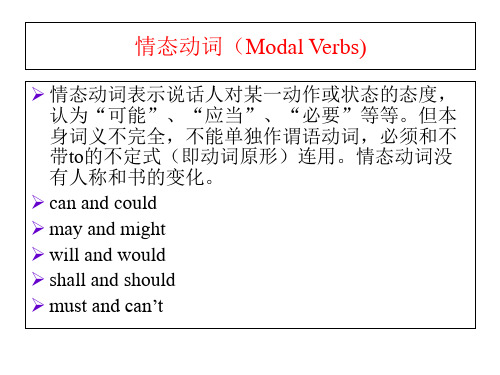
➢ 5. (may/can) ____c_a_n_____you swim? 表示能力
➢ 6. Listen, please. You (may not/might not)
____m__a_y__n_o_t______ speak during this exam.
表示不允许
may, might, can, could
may, might, can, could
表示猜测
➢ 1. They (can/might) ____m_i_g_h_t___be away for the
weekend but I’m not sure.
表示许可
➢ 2. You (may/might) ___m__a_y____leave now if you
can and could
➢So he can carry heavy books. ➢ability ➢He couldn't open the door by himself. ➢ability ➢Could you open the door, please? ➢request
can and could
表示猜测(不可能)
➢7. They (can not/may not) ___c_a_n_n_o_t_______ still be out, the light is on in the house.
➢8. You (couldn’t/might not) 表示许可
____c_o_u_ld_n_’_t_______ smoke on the bus.
➢9. With luck, tomorrow (can/could) ___c_o_u_ld____be a cooler day. 表示猜测
情态动词can的用法课件

情态动词表示说话人对某一动作 或状态的态度或看法,包括可能 性、必要性、意愿等。
特点
情态动词没有人称和数的变化, 其后必须接动词原形。
情态动词分类
可能性情态动词
can, could, may, might
必要性情态动词
must, should, ought to
意愿性情态动词
will, would, shall, should
混淆can与may的用法
03
can表示能力和可能性,而may表示推测或允许,两者在语境中
应区分使用。
情态动词can拓展知识点
情态动词can的过去式
could,用法与can相似,但语气更委婉。
情态动词can与其他情态动词连用
如“You should can do it.”(你应该能做到。)表示强调。
用could表示推测与猜测
要点一
could用于推测过去或现在
could是can的过去式,但也可以用于表示对现在或过去的 推测,例如,“He could be busy.”(他可能很忙。)
要点二
could表示猜测的语气
与can相比,could表示的猜测语气更为委婉或不确定,通 常用于表示基于不完全信息或主观判断的推测,例如, “It could be a good idea.”(这可能是个好主意。)
情态动词can的用法课件
目录
CONTENTS
• 情态动词can基本概念 • 情态动词can表示能力 • 情态动词can表示可能性与推测 • 情态动词can与其他情态动词比较 • 情态动词can在特殊句型中的运用 • 情态动词can总结与拓展
01
CHAPTER
情态动词can基本概念
特点
情态动词没有人称和数的变化, 其后必须接动词原形。
情态动词分类
可能性情态动词
can, could, may, might
必要性情态动词
must, should, ought to
意愿性情态动词
will, would, shall, should
混淆can与may的用法
03
can表示能力和可能性,而may表示推测或允许,两者在语境中
应区分使用。
情态动词can拓展知识点
情态动词can的过去式
could,用法与can相似,但语气更委婉。
情态动词can与其他情态动词连用
如“You should can do it.”(你应该能做到。)表示强调。
用could表示推测与猜测
要点一
could用于推测过去或现在
could是can的过去式,但也可以用于表示对现在或过去的 推测,例如,“He could be busy.”(他可能很忙。)
要点二
could表示猜测的语气
与can相比,could表示的猜测语气更为委婉或不确定,通 常用于表示基于不完全信息或主观判断的推测,例如, “It could be a good idea.”(这可能是个好主意。)
情态动词can的用法课件
目录
CONTENTS
• 情态动词can基本概念 • 情态动词can表示能力 • 情态动词can表示可能性与推测 • 情态动词can与其他情态动词比较 • 情态动词can在特殊句型中的运用 • 情态动词can总结与拓展
01
CHAPTER
情态动词can基本概念
情态动词should的用法PPT课件

3
四、在某些从句中,should 表示惊异、意外等 情绪,常译为“竟然”。 例如:It seems unfair that this should happen to me.真不公平,这件事竟然发生在我 身上。
4
五、should 用于主句中,主语是第一人称, 表示某一条件下所产生的必然结果,并与事 实相反;当主语是第二、三人称时,表示说话 人或执笔人的意志或看法。 例如:If I met her, I should tell her about it. 如果我碰到他,我肯定会将此事告 诉他。
一、Should 表示过去将来时,即从过去观点看 将来要发生的事,多用于间接引语中。
例如:We thought that we should never see you again. 我们想我们再也看不到你了。
The BBC weather report this morning said that we should have rain. 今天早上,BBC电台天气报告说,今天有雨。
【答案】D 【解析】should表示建议,告诉某人应该做什么。
12
Should含义方法总结:
1 过去将来
2
义务、责任
3
假设
4
惊异、意外
必然结果、人
5
的意志看法
13
14
【答案】C 【解析】should向别人提建议。
11
2.(上海高考真题) According to the air traffic rules, you( )switch
off your mobile phone before boarding. A. may B. can C. would D. should
(10上海29)
四、在某些从句中,should 表示惊异、意外等 情绪,常译为“竟然”。 例如:It seems unfair that this should happen to me.真不公平,这件事竟然发生在我 身上。
4
五、should 用于主句中,主语是第一人称, 表示某一条件下所产生的必然结果,并与事 实相反;当主语是第二、三人称时,表示说话 人或执笔人的意志或看法。 例如:If I met her, I should tell her about it. 如果我碰到他,我肯定会将此事告 诉他。
一、Should 表示过去将来时,即从过去观点看 将来要发生的事,多用于间接引语中。
例如:We thought that we should never see you again. 我们想我们再也看不到你了。
The BBC weather report this morning said that we should have rain. 今天早上,BBC电台天气报告说,今天有雨。
【答案】D 【解析】should表示建议,告诉某人应该做什么。
12
Should含义方法总结:
1 过去将来
2
义务、责任
3
假设
4
惊异、意外
必然结果、人
5
的意志看法
13
14
【答案】C 【解析】should向别人提建议。
11
2.(上海高考真题) According to the air traffic rules, you( )switch
off your mobile phone before boarding. A. may B. can C. would D. should
(10上海29)
- 1、下载文档前请自行甄别文档内容的完整性,平台不提供额外的编辑、内容补充、找答案等附加服务。
- 2、"仅部分预览"的文档,不可在线预览部分如存在完整性等问题,可反馈申请退款(可完整预览的文档不适用该条件!)。
- 3、如文档侵犯您的权益,请联系客服反馈,我们会尽快为您处理(人工客服工作时间:9:00-18:30)。
dare
no one, nobody连用;
done
3Байду номын сангаас常以needn’t 和daren’t(sth.) need
doing
的形式出现;
4.dare有其过去时dared.
判断正误: How dare you say such a thing?
How dare you to say such a thing?
He daren’t to speak English before such a crowd, did he?
He daren’t speak English before such a crowd, dare he?
Nobody need to be afraid of catching the disease. Nobody need be afraid of catching the disease.
--Must we do it now? --No, you __n_e_e_d_n_’_t__.
(don’t have to)
表示推测——情态动词的重要用法.
1. You must be Mr Smith----I was told to expect you here.
2. He must have known what we wanted. 3. We may have read the same report. 4. He can’t have slept through all that noise. 5. There’s someone outside----who can it be? 6. What can they be doing? 7. These pills might help to cure your disease. 8. You could be right, I suppose.
____ remain in their seats until all the papers
have been collected.
(2002上海高考题)
A. can B.will C. may D. shall
3.--I heard they went skiing in the mountains last
可以用not表示“可能不”
+V.
+ V.
+ have done
+ be doing
+ V.
+ V.
+ have done
+ be doing
1. I don't know where she is, she __m_a_y___ be in Wuhan. 2. At this moment, our teacher _m__u_st__b_e_m__a_r_k_in_g__ our exam papers. 这时,我们老师想必在批改试卷。 3. The road is wet. It _m__u_s_t _h_a_v_e_r_a_i_n_e_d_ last night.
可兼做行为动词的情态动词:need 、 dare
情态动词 (+动词原形)
行为动词
1.无人称和数的变化; need 2.尤其用于:
*否定句及疑问句中;
多用于肯定句;
(sb.) need to do
*在if/whether之后; .
dare to do
*或与hardly, never, (sth.) need to be
语法讲义之
情态动词 modal verbs
向永平
1.--Is John coming by train?
--He should, but he ____ not. He likes driving
his car.
(2002高考题)
A. must B. can C. need D. may
2.It has been announced that candidates(候选人)
表示推测——情态动词的重要用法.
情态动词
对将来
肯定的推测
+ V.
must 常见must be
对现在
对过去
+ V.
+ have done
+ be doing
可能的推测
may, might
否定的推测
can’t, couldn’t
疑问的推测
can, could
+ V.
+ V.
+ have done
+ be doing
情态动词
表示推测 不表示推测
I daren’t ask her for a rise. 我不敢请求她加薪. How did you dare to tell her that? I wonder whether he dare stand up in public. I don’t know how she dares to wear that dress. Do you need any help? I wonder whether he need send it immediately. I need hardly tell you that the work is dangerous. The garden doesn’t need watering at the moment. You needn’t finish that work today.
winter.
(2002北京高考题)
--It ____ true because there was little snow there.
A. may not be
B. won’t be
C. couldn’t be
D. mustn’t be
can could may might shall should must will would ought to have to dare (daren’t) need (needn’t) used to
No, ____yo__u_n_e_e_d_n_’_t___. No, __y_o_u_d_o_n_’_t_h_a_v_e__to_.
needn’t 对其它情态动词的回答:
--Shall I tell John about it? --No, you __n_e_e_d_n_’_t__.
(don’t have to)
These dishes need be cleaned carefully. These dishes need to be cleaned carefully. These dishes need cleaning carefully.
注意对need问句的回答:
--Need I finish the work today? --Yes, ____y_o_u_m__u_s_t_____.
